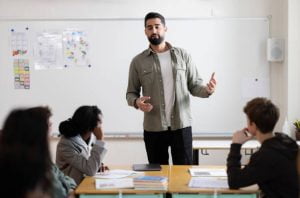How to Become a Teacher in Texas without a Degree
If you are searching for how to become a teacher in Texas without a degree, you’ve come to the right place!
If you don’t have a degree but wish to become a teacher in Texas, you may be wondering how possible this can be.
To become a certified teacher in Texas, you will most definitely need a degree as well as some other necessary qualifications.
But the good news is that there are alternative options for people who do not have a teaching degree but still want to become a teacher in Texas.
If you have a passion for teaching in Texas but don’t have a degree, I got you covered!
In this comprehensive guide, we will explore how to become a teacher in Texas without a degree as well as other essential things you need to know.
Ready? Let’s dive in!
Also Read: How to Become a Writer without a Degree
What Is a Teacher?

A teacher is an educator who imparts knowledge, skills, and values to students in formal educational settings.
Beyond conveying subject matter, teachers guide and mentor students, promote critical thinking, and adapt their methods to diverse learning styles.
They create lesson plans, assess student progress, and maintain a positive classroom environment.
Teachers also offer emotional support, identify learning challenges, and act as role models for ethical behavior.
Continuous professional development keeps teachers informed about evolving educational practices.
Their impact extends beyond academics; teachers contribute to community involvement and the holistic development of students.
Overall, teachers shape students’ intellectual, emotional, and social growth, playing a vital role in preparing future generations for success.
Recommended: Can You Be a Social Worker with a Psychology Degree?
Roles of a Teacher

Teachers play multifaceted roles that extend beyond the traditional classroom setting.
These roles encompass various aspects of education, personal development, and community engagement:
1. Educator
The primary role of a teacher is to impart knowledge and skills in their subject area.
They design and deliver lessons, create curriculum plans, and facilitate learning through lectures, discussions, and hands-on activities.
2. Facilitator of Learning
Teachers guide students in actively engaging with the learning process.
They encourage critical thinking, problem-solving, and independent inquiry, fostering a deeper understanding of the subject matter.
3. Mentor and Guide
Teachers provide guidance and support to students, helping them set goals, develop study strategies, and overcome challenges.
They offer academic and personal advice, promoting growth and self-confidence.
Also See: Is a Psychology Degree Useless? (All You Should Know)
4. Assessor and Evaluator
Teachers assess student progress through assignments, exams, and other assessments.
Constructive feedback helps students gauge their understanding and make improvements.
5. Classroom Manager
Maintaining an organized and respectful classroom environment is crucial.
Teachers establish rules, manage behavior, and promote a positive atmosphere conducive to learning.
6. Role Model
Teachers exemplify values such as curiosity, respect, integrity, and a passion for learning.
They serve as role models, influencing students’ character development and ethical behavior.
7. Counselor and Supporter
Teachers offer emotional support, recognizing students’ individual needs and concerns.
They identify signs of distress and connect students with appropriate resources when necessary.
8. Curriculum Designer
Teachers design and adapt curriculum to suit the needs of diverse learners.
They incorporate innovative teaching methods, educational technologies, and real-world applications to enhance learning experiences.
Also Read: Do You Need a Degree to Be an Accountant?
9. Lifelong Learner
Effective teachers are committed to continuous professional development.
They stay informed about educational trends, research, and evolving teaching methodologies.
10. Community Contributor
Teachers often engage with parents, administrators, and the broader community.
They participate in extracurricular activities, parent-teacher associations, and community outreach, contributing to societal development.
11. Cultural and Social Influencer
Teachers introduce students to various perspectives, cultures, and societal issues.
They promote inclusivity and help students develop a global outlook.
12. Innovator and Adaptor
In an ever-changing educational landscape, teachers innovate in their teaching methods to meet the needs of the digital age, fostering creativity and adaptability in students.
Overall, teachers are pivotal figures who not only educate but also shape students’ character, foster critical thinking, and contribute to society’s development.
Their roles extend beyond the classroom, influencing students’ personal growth and preparing them for the challenges of the future.
Recommended: Can I Become a Chiropractor without a Degree?
How to Become a Teacher in Texas without a Degree

Becoming a certified teacher in Texas typically requires a bachelor’s degree and completion of an approved teacher preparation program.
However, if you’re interested in becoming a teacher without a traditional degree, there are some alternative pathways you could explore.
Here are a few potential paths to consider:
1. Alternative Certification Programs
Texas offers alternative certification programs for individuals who have a bachelor’s degree but not in education.
These programs provide a way to become certified while you work as a teacher.
You would need to complete an approved alternative certification program, which typically includes coursework, training, and mentorship in a classroom setting.
After completing the program, you can apply for a probationary certificate to teach in Texas schools.
2. Emergency Certification
In some cases, Texas may issue emergency teaching certificates to individuals who have expertise in a high-need subject area or a critical shortage area.
This is often a temporary measure to address immediate staffing needs.
Emergency certificates are not a long-term solution, and you would likely be required to work towards standard certification through an alternative certification program.
3. Teaching Assistant or Paraprofessional
While not a full-fledged teacher role, you might consider becoming a teaching assistant or paraprofessional in a school.
These roles often require a high school diploma or equivalent and may involve supporting classroom teachers with various tasks.
Also See: How to Become a Midwife without a Nursing Degree
4. Charter Schools or Private Schools
Some charter schools or private schools might have different requirements for teaching positions compared to public schools.
It’s possible that they may have more flexibility in terms of educational qualifications, but the specific requirements can vary widely.
5. Community Colleges and Adult Education Centers
Teaching at a community college or adult education center might have different qualification requirements compared to K-12 education.
These institutions often focus on specific skills or vocational training, which might open up opportunities for individuals with expertise in certain fields.
6. Continuing Education and Skill Development
If your goal is to share your expertise or skills with others, you could consider teaching workshops, classes, or courses through community centers, online platforms, or other venues.
While this might not be a traditional teaching position, it allows you to share your knowledge with others.
Remember, teaching is a profession that involves guiding and educating students, and it’s important to be adequately prepared to provide effective instruction and support their learning.
Recommended: How to Become a Graphic Designer without a Degree
How Much Are Teachers Paid in Texas?
Teacher salaries in Texas can range quite a bit.
On average, public school teachers in Texas can make around $54,122 a year.
But remember, this is just an average, and the actual pay can differ based on things like how many years a teacher has been working, their level of education, and where they’re teaching.
If you have more experience or higher education, you might earn more.
Also, where you teach matters – urban areas might offer higher salaries due to the higher cost of living.
Plus, certain subjects or grade levels in demand might come with extra incentives.
Keep in mind, though, that teacher salaries can change based on school district budgets and policies.
For the most current info, it’s best to check with the Texas Education Agency or the specific school districts you’re interested in.
Also See: How to Become a Real Estate Agent without a Degree
Necessary Skills Every Teacher Should Have
As a teacher, there are certain skills you should have under your belt.
Here are some of the necessary skills every teacher should have:
1. Communication Skills
Think of teaching as a two-way street of sharing knowledge.
Effective communication helps you explain concepts clearly, listen to students’ questions, and connect with parents and fellow educators.
It’s about being a great listener and speaker.
2. Adaptability
Imagine a classroom like a stage – every day is a new performance.
You’ll encounter different learning styles, unexpected questions, and even tech glitches.
Being adaptable means you’re ready to tweak your plans and strategies on the fly.
3. Classroom Management
Here’s where you channel your inner maestro.
Managing a classroom involves setting rules, handling disruptions, and maintaining an environment where learning thrives.
It’s like orchestrating a harmonious symphony of learning.
4. Patience and Empathy
Kids are at different points in their learning journeys, and they face challenges too.
Being patient and empathetic creates a safe space where students feel comfortable asking questions and making mistakes.
Recommended: How Long Does It Take to Get a Business Degree?
5. Subject Matter Expertise
Picture yourself as the guide on a fascinating adventure.
You need to know your subject inside and out to navigate students through the curriculum and answer their queries with confidence.
6. Critical Thinking and Problem-Solving
Teachers are like puzzle masters.
Encouraging students to think critically and solve problems helps them develop skills that go beyond the classroom.
7. Creativity
You’re the artist of education, painting lessons that captivate and engage.
Weave creativity into your teaching to make subjects come alive and spark students’ curiosity.
8. Organization and Time Management
Juggling lesson plans, grading, and meetings can be a bit like a circus act.
Staying organized and managing your time well ensures you can handle it all.
9. Collaboration
Education is a team effort.
Collaborating with other teachers, specialists, and parents amplifies the impact of your teaching.
Sharing ideas and working together fosters a supportive educational community.
Also See: Which Is Better Architecture or Civil Engineering in Nigeria?
10. Technology Proficiency
Embrace the digital age.
Incorporating technology into lessons opens new doors for interactive learning and prepares students for the tech-driven world.
11. Cultural Competence
Your classroom is a microcosm of the world.
Being culturally competent ensures that every student feels seen, heard, and valued – it’s the key to an inclusive and respectful environment.
12. Leadership Skills
Teachers are like captains guiding their students’ educational journey.
Demonstrating leadership qualities encourages students to take charge of their learning and growth.
13. Reflective Practice
Imagine having a teaching mirror.
Reflective practice lets you assess your methods and adapt based on what’s working and what’s not.
It’s a continuous cycle of improvement.
14. Parent and Community Engagement
Teaching doesn’t stop at the classroom door.
Building relationships with parents and involving the community enriches the educational experience for everyone involved.
These skills come together to create an inspiring and effective learning environment, helping you shape the minds of tomorrow.
Also Read: 10 Sports Scholarships in the USA for International Students
Frequently Asked Questions (FAQ)
How Do I Become a Teacher in Texas with a Foreign Degree?
If you’ve got a foreign degree and want to teach in Texas, here’s the scoop.
First off, get your degree checked out by a legit credential evaluation service to see how it stacks up in the U.S.
Make sure your English is good to go too, maybe take a TOEFL or IELTS test.
Then, pick a program, like an alternative certification one or a uni that’s cool with foreign degrees.
You might need some extra classes or tests to fill in the gaps.
Joining an educator prep program is key, and don’t forget to ace the Texas Examinations of Educator Standards.
And a background check is on the list too.
Once you’re set, snag that teaching certificate from the Texas Education Agency.
Can You Teach in Texas without an Education Degree?
Yes, in Texas, you can teach without an education degree.
They’ve got these alternative certification paths.
So, even if you didn’t major in education, you can still become a certified teacher.
You’ll need a bachelor’s degree, sure, and you’ll have to finish up an educator prep program.
And don’t forget about passing exams like the Texas Examinations of Educator Standards.
Plus, they’ll check your background, no surprises there.
Programs like Teach For America or those hooked up with universities offer these alternative options.
Just remember, you need to show you know your stuff, especially in the subject you want to teach.
Just research the right route for you and you’re on your way!
How Long Does It Take to Get a Teaching Certificate in Texas?
Getting a teaching certificate in Texas usually takes around 1 to 2 years.
If you’ve got a bachelor’s degree in education, it’s typically a year-long process, including completing an educator preparation program and passing required exams like the Texas Examinations of Educator Standards.
If you hold a bachelor’s in another field, alternative certification might be your route.
This can take about 1 to 2 years, factoring in additional coursework and exams.
It’s important to note that timelines can vary based on program specifics, testing schedules, and individual progress.
Planning and staying on top of requirements will help you navigate the process more smoothly.
What Exams Are Required for Teacher Certification in Texas?
In Texas, to get a teaching certificate, you’ll need to tackle the Texas Examinations of Educator Standards (TExES) exams.
They’re like tests to check if you’re ready to teach your chosen subject and grade.
If you’re going for the general certification, there’s another exam called Pedagogy and Professional Responsibilities (PPR) to see how you handle teaching stuff.
If you’re into bilingual teaching, there’s the Bilingual Target Language Proficiency Test (BTLPT).
And, if you’re switching careers, there might be extra content exams for your field.
These tests are like the gatekeepers to your teaching dreams in Texas, making sure you’re all set to rock the classroom!
Is the Texas Teacher Certification Test Hard?
The difficulty of the Texas teacher certification test, also known as the Texas Examinations of Educator Standards (TExES), can vary.
It depends on your familiarity with the subject, your preparation, and your teaching experience.
Some find it challenging due to its comprehensive nature and the need to demonstrate deep subject knowledge and effective teaching practices.
Adequate preparation, which might include studying content, taking practice tests, and engaging in educator preparation programs, can greatly influence your success.
While it can be demanding, with dedication and focused preparation, many aspiring teachers successfully pass the TExES exams and obtain their teaching certification.
Recommended: 10 Public Health Scholarships for International Students in the USA
Conclusion
Even if you don’t have a degree, you can still become a teacher in Texas.
While a traditional degree is the most common path to becoming a teacher in Texas, there are alternative options you can explore.
In this article, I’ve shown you how to become a teacher in Texas without a degree.
By following all the steps we’ve discussed here, you can successfully become a teacher in Texas despite not having a degree.
If you have any questions or inquiries, kindly drop them in the comment section and I will respond as soon as possible.
Best of luck!
Related Posts:
- 10 Fully Funded Nursing Scholarships for International Students in Canada
- 15 Best MBA Scholarships for Women
- 10 Canadian Scholarships for Nigerian Students
- Which Is Better Medicine or Pharmacy in Nigeria?
- How Many Years Does It Take to Study Pharmacy in Nigeria?
- Can a Nigerian Pharmacist Work in the UK?
- Where Can I Work If I Study Pharmacy in Nigeria?
- Can a Nigerian Pharmacist Work in the USA?
- Top 10 States in Nigeria with High Employment Opportunities
- Is Pharmacy a Good Course to Study in Nigeria?
- 10 Tips to Pass GCE Examination
- List of Universities That Accept Low JAMB Score
- 20 Secrets of First Class Students in Nigeria
- How to Improve Your Public Speaking Skills as a Nigerian Student
- How to Improve Your Writing Skills as a Nigerian Student






